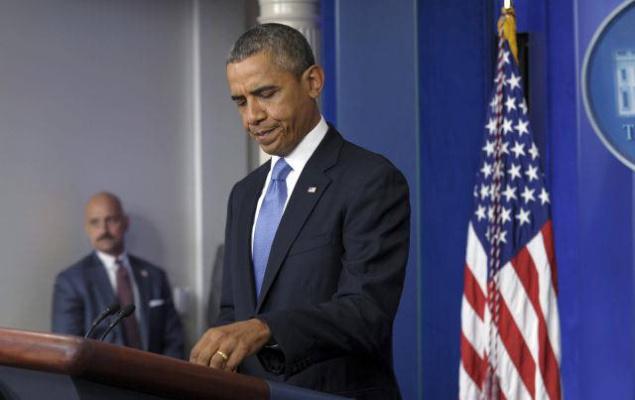Washington, October 1: The standoff that partially shut down the U.S. government on Tuesday deepened as the Democratic-led Senate rejected the latest House Republican effort to negotiate on a spending bill stalled by conservative efforts to derail the health care overhaul.
In a 54-46 party-line vote, the Senate turned aside a House request to name negotiators to a conference to resolve differences. Senate Majority Leader Harry Reid said he would not negotiate as long as Republicans were holding up a straightforward spending bill to keep the government operating.
About 800,000 federal workers are being forced off the job in the first government shutdown in 17 years, suspending most nonessential federal programmes and services.
It wasn’t clear how long the standoff would last, but there were no signs of compromise. The Senate vote marked the fourth time during this fight that it has rejected House Republican efforts.
President Barack Obama, who has vowed not to allow Republicans to cripple his signature health care law, readied a midday statement to the nation as Democrats and Republicans maintained a blame-each-other duel in Congress.
Stock markets around the world reacted resiliently, with analysts saying significant damage to the U.S. economy was unlikely unless the shutdown lasted more than a few days. U.S. stocks edged higher in early trading on Tuesday, while European stocks mostly recovered after falling the day before the shutdown deadline. Asian stocks were mixed.
The stalemate pits Democrats against a core of conservative activists who have mounted a campaign to seize the must-do budget measure in an effort to dismantle the 2010 health care reform, which is intended to provide coverage for the millions of Americans now uninsured.
Republicans passionately oppose the plan they have dubbed “Obamacare” as wasteful and restricting freedom by requiring most Americans to have health insurance.
A key part of the health law was taking effect Tuesday, unaffected by the shutdown. Enrolment opened for millions of people shopping for medical insurance.
Also exempt from the shutdown were people classified as essential government employees, including air traffic controllers, Border Patrol agents and most food inspectors.
National parks, museums in Washington and agencies like NASA and the Environmental Protection Agency nearly closed. The National Zoo in Washington closed to visitors and turned off the popular panda cam that had showed off a weeks-old cub.
Pentagon and administration lawyers were looking for ways to expand the number of Defence Department civilians who are exempt from furloughs, amid worries that that the shutdown is damaging U.S. credibility among its international allies, Defence Secretary Chuck Hagel said on Tuesday.
“It cuts straight to the obvious question — Can you rely on the United States as a reliable partner to fulfill its commitments to its allies?” Mr. Hagel told reporters travelling with him to South Korea.
Until now, such temporary spending bills have been routinely passed with bipartisan support, ever since a pair of unpopular shutdowns in the winter of 1995-1996 severely damaged Republican election prospects and revived then-President Bill Clinton’s political standing.
Mr. Obama accused Republicans of holding the budget hostage to get what they want.
“You don’t get to extract a ransom for doing your job, for doing what you’re supposed to be doing anyway, or just because there’s a law there that you don’t like,” Mr. Obama said on Monday, delivering a similar message in private phone calls later to Republican House Speaker John Boehner and other lawmakers.
Mr. Boehner said he didn’t want a government shutdown, but he insisted that the health care law “is having a devastating impact… Something has to be done.”
Republican leaders have voiced reservations about the effort and many lawmakers predicted it wouldn’t work, fearing the public will blame their party for the shutdown. But individual Republican House members may face a greater risk by embracing a compromise. Many represent heavily partisan congressional districts, and voters in Republican primaries have ousted lawmakers they see as too moderate.
It appeared for now that the Democrats had the upper hand.
“We can’t win,” said Republican Senator John McCain, adding that “sooner or later” the House would have to agree to Democrats’ demands for a simple, straightforward funding bill reopening the government.
Federal workers were told to report to their jobs for a half-day but to perform only shutdown tasks like changing email greetings.
The White House was operating with a skeletal staff, including household workers taking care of the first family’s residence and presidential aides working in the West Wing.
The State Department will continue processing foreign applications for visas. Embassies and consulates overseas will continue to provide services to American citizens.
The underlying spending bill would fund the government through November 15, 2013 if the Senate gets its way or until December 15, 2013 if the House does.
Looming ahead is a potentially more dangerous fight — Republicans are likely to take up the health care fight again when Congress must pass a measure to increase the nation’s borrowing cap. The U.S. risks a market-rattling, first-ever default on its obligations if Congress fails to raise that limit.

